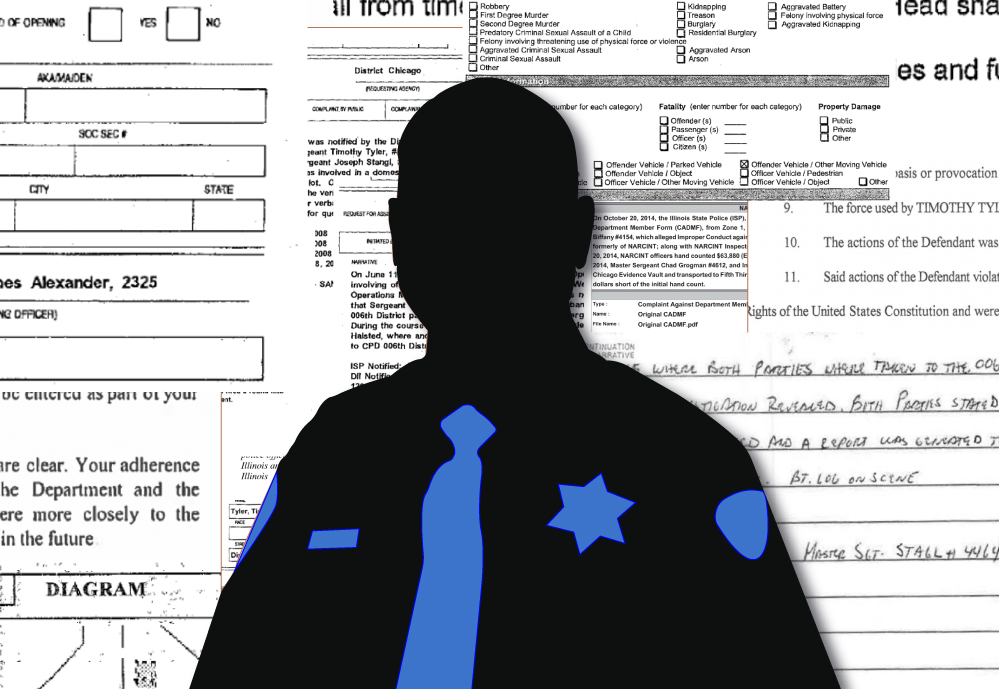
A version of this article originally appeared on IPM Newsroom on January 9, 2024. It has been edited for space and style. See the full version on the Public i website.
This story is part of a partnership between the Champaign-Urbana Civic Police Data Project of the Invisible Institute and IPM Newsroom, and was supported with funding from the Data-Driven Reporting Project.
When Timothy Tyler applied for the Champaign Police Chief position in 2022, the city council was given his “resumes and cover letters and recommendations—things of that nature,” according to councilmember Davion Williams. Documents suggest the council was not privy to a more detailed accounting of Tyler’s policing history, which is marked by a trail of disciplinary actions and other incidents ranging from suspensions for “unfavorable” conduct to entanglements in several federal civil rights lawsuits. After receiving questions about Tyler’s background from a reporter, Williams forwarded the email to City Manager Dorothy Ann David, and asked, “Were we aware of these incidents as a city?”
Several of the investigations into Tyler’s misconduct led to settlements and disciplinary action. Among those: an off-duty domestic incident with an ex-girlfriend and an improper vehicle pursuit that ended in a crash outside of Chicago Police headquarters. In addition, civil rights lawsuits accused him of false arrest and conspiring with city officials to illegally shut down a nightclub.
According to the Champaign city manager’s office, Tyler disclosed his “disciplinary history as part of his application materials for the job.” However, the details of what Tyler specifically disclosed in his application remain unclear, because the city refuses to release either the background investigation it commissioned or the questionnaire filled out by Tyler—claiming those records contain proprietary materials of the accounting firm the city hired to search for its new police chief.
In response to the allegations, which were verified by documents obtained from Illinois State Police (ISP), David emailed a statement saying Tyler’s professional references complement his leadership and performance. “The incidents of discipline from earlier in the Chief’s career were handled by his employers according to their policies,” she continued, “and did not hinder the Chief from being promoted through the ranks in those agencies.” David refused to answer any additional questions about the incidents. Champaign Police Department would not make Tyler available for comment.
This lack of transparency is seemingly at odds with how Tyler himself has described his early workings with the city. “The city of Champaign puts their money where their mouth is,” Tyler said in an interview released by the city in February, 2023. “I’ve never really seen a city government where they’re very upfront and transparent about the relationship with the police department.”

Champaign Police Chief Timothy Tyler during a promotional interview released by the city in February 2023. Photo by City of Champaign
But if the city is so transparent, why haven’t officials disclosed more about Tyler’s background to councilmembers and the public? That’s a question raised by activist Rita Conerly. “It’s disturbing to know that we have someone who has had disciplinary actions against them and they are now in this position of the highest leadership within our police,” Conerly said.
Illinois State Police: Suspensions and Settlements
One night in June, 2008, at around 1:30 am, Tyler drove to the Chicago Police Department (CPD)’s Sixth District, on the city’s South Side. There he got into an argument with his ex-girlfriend, a CPD officer. After she got into his personal vehicle, Tyler locked the car doors and drove to an alley behind a grocery store, where they continued to argue loudly.
Eyewitnesses later told ISP internal investigators that both Tyler, who was a sergeant in ISP’s Des Plaines office at the time, and his ex-girlfriend had taken their guns out of their holsters, and that the ex-girlfriend had briefly pointed her weapon at Tyler.
According to an eyewitness, Tyler also pulled his ex-girlfriend by her utility belt and grabbed her arm. “You f***ed up, you put your hands on me, don’t make me shoot you,” she responded, the eyewitness told ISP investigators. (The woman, who is still a CPD officer, did not respond to requests for comment.) CPD officers interviewed by ISP investigators said Tyler seemed slightly intoxicated; he told responding CPD officers that he had only had one or two beers that night.
ISP investigators sustained charges against him for not immediately notifying superiors of his contact with police, conducting himself “unfavorably,” and improperly drinking while off-duty. Before he could be interviewed for the internal investigation, Tyler notified ISP that he wanted to sign a settlement agreement. Disciplinary settlement agreements with ISP “benefit the accused officer by allowing the officer to avoid an investigation and discipline process by admitting to wrongdoing and accepting discipline,” ISP policies state.
Tyler was eventually suspended for seven days.
Later in 2008, Tyler was disciplined for improperly pursuing a car that had fled a traffic stop, receiving a written reprimand.
Markham: Federal Lawsuits and Corruption Allegations
In the 1990s, Tyler was an officer in Markham, a southern suburb of Chicago. There, he was named in three federal lawsuits—two of which were dismissed. The first accused Tyler of soliciting nightclub owner Leonard Garrett “for cash to secure police protection.” After refusing and complaining to city officials, Garrett alleged that the city government began retaliating against him.
The second lawsuit accused Tyler of pressuring another citizen, Michael Corbett, into apologizing to another Markham officer that Corbett said arrested him without reason. The third accused Tyler of excessive force and false arrest, and was settled out of court.
Unanswered Questions and Document Denials
While the Champaign City Council is invited to provide informal input on who is hired for city jobs, the ultimate decision lies solely with the city manager, according to the city’s municipal code. The lack of formal input concentrates the decision-making power in one person’s hands: City Manager David. There was no official hiring committee for the position, Williams said in an interview, and David held just one public meeting for residents to meet her finalists.
Mayor Deb Feinen did not respond to requests for comment.
As a survivor of domestic violence, Conerly said she’s disappointed by Tyler’s background, which includes an allegation of domestic violence. It’s even more disappointing, she said, that Tyler did not request any further training or changes to the department’s response to domestic violence calls after joining the department. As Invisible Institute and IPM Newsroom reported in the November-December Public i, Conerly filed a complaint against the Champaign Police Department in 2020 after an officer did not make a report during a domestic incident, something that previous chief Anthony Cobb had identified as an issue of wider “agency culture.”
“It weighs heavy, because we know, especially with domestic violence, that police don’t respond to victims in a way in which the victims need,” Conerly said. “And so to have someone at the top, who has conducted similar activity, it’s almost like a slap in the face.”
Additional reporting by Isra Rahman, Invisible Institute.

Farrah Anderson is an investigative reporting fellow with the Invisible Institute and Illinois Public Media and a journalism student at the University of Illinois.

Sam Stecklow is a journalist, editor, and Freedom of Information Act Fellow with the Invisible Institute. He works on its Champaign-Urbana Civic Police Data Project and investigations.
756 total views, 1 views today
